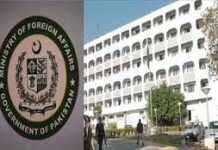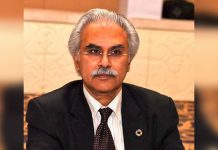A holistic approach and reliable database on water resources and their usage acr
oss the Pakistan is the key to achieving food, water and energy security in the fifth most climate-vulnerable country in the world, according to the panellists who attended a UN Food Systems Summit Independent Dialogue held yesterday.
The Dialogue, organised by the Internation
al Water Management Institute (IWMI) and partners, highlighted the need for transformative approaches to promote equ
ity and inclusion in WEF nexus governance for sustainable water, energy and
food systems. Other outcomes from the discussion, which included contributions from the IFPRI, Hisaar Foundation, Sustainable Development Policy Institute (SDPI), Pakistan Council of Research in Water Resources (PCRWR), FAO, Glob
al Water Partnership, Pakistan Agricultural Research Council (PARC), flagged the need for a substantial increase in research and development funds for the agriculture sector through active dialogues with donors and development partners.
Dialogue participants laid emphasis on improving policy coherence among ministries through better coordination and capacity building and raising awareness among researchers, policymakers, government officials and farmers about the benefits of WEF nexus modelling approaches to optimise the agriculture production. Furthermore, they laid stress on the need for sizable interdisciplinary projects to realise true systems transformation and WEF nexus operationalization through pilot projects in the Indus Basin of Pakistan that hosts one of the world’s largest contiguous irrigation networks.
Conclusions from this event and three other Independent Water Dialogues will contribute to the Global Dialogue titled ‘Water: the game changer for
food systems’ on April 27 and ultimately to the UN Food Systems Summit in September.
The objective of the dialogue was to discuss how a shared vision for water and
food security in the South Asian country could be achieved in a changing climate. Research shows that water security is posing serious challenges for the social and economic development of Pakistan, an agrarian country of 220 million people, amid the COVID-19 pandemic.
IWMI Director General Dr Mark Smith said, “Pakistan is a region that is highly vulnerable to climate change. These conditions are negatively affecting water, agriculture, health, environment and other sectors in Pakistan. So, managing water risks in the
food system is going to be one of the highest priorities in the future
food system of Pakistan.”
Closing the argument, Dr Smith said there was a growing urgency for action vis-à-vis the role of water in the
food system. He said that acting with urgency required clar
ity and a shared u
nderstanding across stakeholders about the stage where practices, technologies and policies should be prioritized. He said that stakeholders should have the u
nderstanding of what financing was needed and where. He said that transitioning from competition amongst sectors to cooperation, including a cross water energy food nexus, would be a vital part of the story of
food system transformation in Pakistan.
“A complex system like IBIS needs complex reforms to move forward, not some simple approaches like general water pricing or so, it needs also investment,” said Prof Jaochim von Braun, chair of the Scientific Group for the UNFSS.













